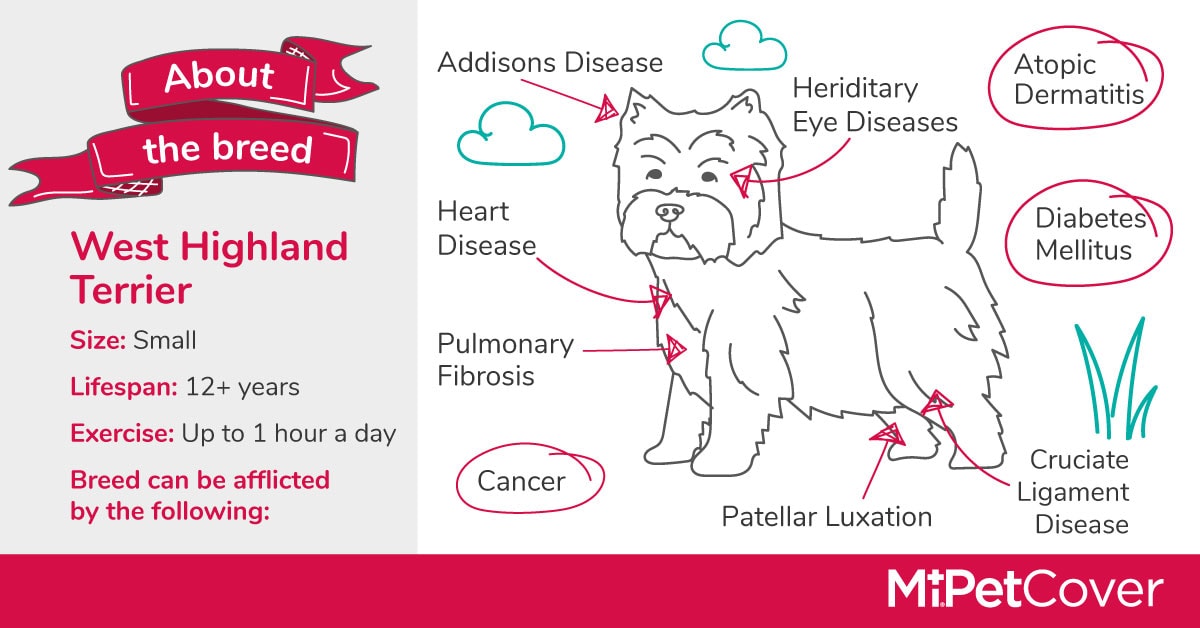West Highland Terriers: Tenacious and Confident Little Dogs
The West Highland Terrier is a Scottish dog that was incredibly popular a few decades ago, but has since been overtaken by newer cross-breed hypoallergenic dogs such as the Cavapoo and Maltipoo in recent years. They were once the most purchased Terrier in England but no longer hold this accolade. Despite this, we still see plenty of Westies within the UK.

A small yet stocky dog, the Westie is well known for its snow white coat. They have erect ears, dark black eyes and a good-sized muzzle. Weighing about 8kg, many owners appreciate their small size, especially when living in smaller homes.
The West Highland Terrier is tenacious and confident, just like any good terrier. They are also cheerful, independent and very switched on. Bred to hunt vermin, their prey drive remains high and they still enjoy playing games of ‘cat and mouse’ with birds and squirrels.
Owners will be the first to admit that Westies are prone to barking and they can become bored quickly. They need at least an hour of exercise a day as well as plenty of mental stimulation to keep them content. If under-stimulated, they may develop vices including furniture chewing and garden digging.
Health Issues in West Highland Terriers
Though Westies tend to live for 12 years or more, there are several health issues that can affect them.

- Atopic Dermatitis. Sadly, a large percentage of West Highland Terriers suffer with chronic itchy skin. They are prone to yeast overgrowth and can be allergic to a range of things including food, grasses, pollens and dust mites. For most dogs, they are managed with anti-itch medicine, medicated washes and courses of antibiotics as needed. It may be worth pursuing allergy testing and immunotherapy, though this can be expensive, costing several thousand dollars over the course of 1 to 2 years.
- ‘Westie Lung Disease’ (Idiopathic Pulmonary Fibrosis). This is a chronic disease that causes lung inflammation, low oxygen levels and a chronic cough. Chest x-rays can usually confirm the diagnosis. While medicine and lifestyle changes will help delay the progression of this disease, it is not a condition that can be cured. Frustratingly, in most cases, we are not yet sure what causes this disease.
- Diabetes Mellitus. High blood sugar levels can lead to signs including excess thirst, urine accidents indoors and an extreme hunger. Dogs may even raid bins and steal food from tables. This condition is easily diagnosed with blood and urine tests. Unfortunately, insulin is expensive and most dogs require daily insulin injections to control their sugar levels. Over a lifetime, the treatment of diabetes is very costly.
- Also known as ‘Addison’s Disease’ this endocrine disorder is sometimes known as ‘The Great Pretender’ as it can mimic other diseases and can be tricky to diagnose. The symptoms of shaking, runny stool and lethargy can come and go. Blood tests and urinalysis can confirm diagnosis and affected Westies are managed with medication for the rest of their life. For most, they can be very well managed in this manner.
- Orthopaedic Knee Issues. Both Patellar Luxation (when the knee cap pops out of place) and Cranial Cruciate Ligament Rupture (when one of the main knee ligaments tears) are not uncommon in this breed. Signs will include limping in the back leg and reluctance to run about and jump. As there is often a genetic component, it is wise to screen breeding parents and to only breed from those with healthy knees.
Westies make an excellent family pet, though are not as popular as they once were. They are typical terriers; full of energy, intelligent and alert to what is going on around them. These dogs are generally hardy and tough but can suffer from a range of medical issues.
Do you need pet insurance for your Westie dog?
As with any pedigree or cross-breed, it’s always a good idea to have a dog insurance policy in place to help with unexpected vet fees.
If you’re introducing a Westie puppy to your home, why not take a look at our four weeks’ free WalkawayCover* created especially for new pups aged 8 weeks to one year?
*Puppy must be between 8 weeks and 1 year old and is subject to a CVS health check. WalkawayCover covers illness and accidents instantly. Not all breeds of dog are eligible.
You might also be interested in…
Get a quote in minutes…

Existing customers
Call now on 0808 164 7999
to discuss your policy with us.
Monday - Friday: 08:00 - 20:00 Saturday: 09:00 - 14:00





 Back
Back
